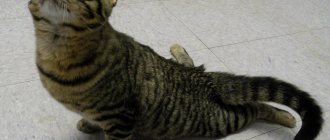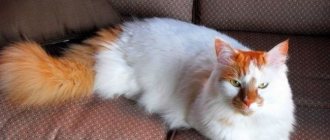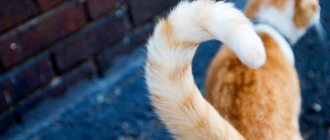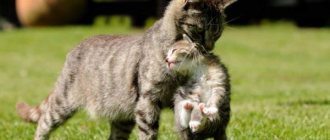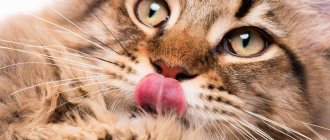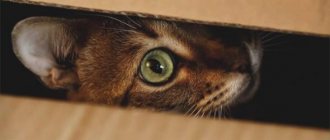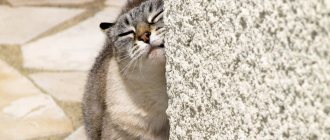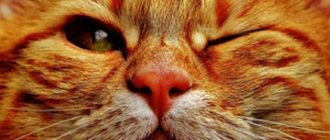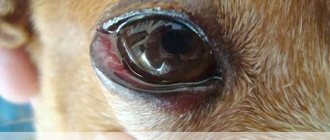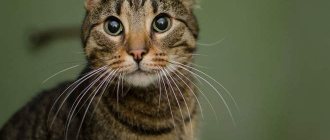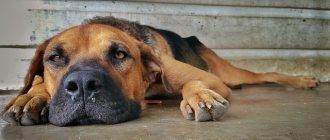An owner who notices that a cat is eating soil will obviously pay special attention to the animal’s behavior. If the case is isolated, then the phenomenon can be attributed to the acquisition of life experience, but what to do if your pet greedily chews black soil and is ready for any tricks for the sake of a dubious delicacy?
Important! Eating dirt on the street can lead to poisoning! Even the cleanest (visually) soil absorbs sediment and exhaust gases and contains compounds of hazardous substances - from sewage to oil waste.
Mental disorder
In human psychiatry, there is such a thing as pica - the desire to eat inedible things . The pathology is referred to as an eating disorder due to a psychological state. The condition is considered serious, similar in severity to anorexia nervosa, bulimia and other eating disorders, which can lead to death.
Unfortunately, very little research on psychiatry is conducted in the veterinary field. Animals cannot speak and this is the main difficulty. However, even primitive observations helped establish that pets are prone to depression, phobias and other somatic disorders. Globally, pica is divided into general disorder and coprophagia. In the first case, the animal eats stones, earth, paper, any waste and inedible materials, in the second - feces. Cats are prone to both forms of pica.
Even the most experienced veterinarian is unlikely to be able to name the exact causes of a mental disorder. Most often, the cause is formed against the background of several factors that took place in the life of the animal. The owner may not have any idea about the experiences of the ward, which greatly complicates the diagnosis. Based on experience, doctors can only speculate about the reasons.
Hunger - when a domestic cat finds itself outside, it hides and the only thing that can drive it out of its hiding place is the desire to eat.
Unfortunately, the psyche of many animals cannot tolerate such severe stress and the animal is literally exhausted from hunger, but does not come out of its shelter. If the owners discover their loss and manage to save it, the consequences are unpredictable.
Hairballs in the stomach
It is known that when cats lick, they swallow their own fur, which gradually becomes compressed in the digestive tract. Such a foreign body leads to discomfort, causing irritation of the mucous membrane and affecting eating behavior. Long-haired cat breeds especially suffer from this problem; they swallow large clumps of hair with their tongues, which are not broken down by digestive juices, clog the stomach and can cause intestinal obstruction.
As a result, so-called “trichobezoars” are formed, sometimes filling the entire stomach cavity and reaching the volume of a tennis ball. To remove them and save the pet's life, urgent surgery is required.
Some hairballs come out naturally or through periodic spontaneous vomiting.
But if this does not happen, the animal begins to instinctively eat objects that stimulate gastric peristalsis, for example:
- grass with long, hard leaves;
- coarse thread;
- New Year's decoration "rain";
- cassette film;
- potted plants and soil.
Sometimes this works as an emetic, but sometimes it even worsens the condition, blocking the intestinal lumen even more.
Expert advice. To prevent the appearance and growth of trichobezoars, you must follow the rules and recommendations:
- Brush your pet regularly and thoroughly, especially during spring and autumn molting.
- Grow fresh and tender stalks of “cat grass” in the house, which is eaten by the cat as an emetic.
- Feed your pet preventative dry food, which contains natural fiber, which helps remove hairs from the gastrointestinal tract even before the formation of compacted balls.
- Use a special malt paste, whose ingredients lubricate the mucous membrane of the digestive tract and facilitate the removal of hairballs naturally (for example: Gimсat Anti-Hairball Duo Paste, Dolfos Lintoff Paste, Synergylabs Richard's Organics, Beaphar Malt Paste, Gimсat Malt-Soft Extra).
Parasites
If your cat eats soil in large quantities and literally runs for treats, remember the last time you carried out worm prevention . Severe infestation causes a feeling of itching, bloating and swelling. In nature, cats sometimes eat sand to get rid of parasites; at home, a pet can eat litter from a tray or soil from flower pots.
Note! If the cause is parasites, the cat will eat the soil greedily. Possible development of vomiting and the presence of soil in the stool.
Recent parasite prevention is not a guarantee. Classic anti-worm medications have a specific spectrum of action. If your pet has picked up an “exotic neighbor,” then conventional medications will not help. To make or confirm the diagnosis, it is necessary to conduct a laboratory analysis of stool, several times (every 2-3 days).
Why is eating soil dangerous?
Needless to say, even accidental ingress of earth is unnatural. Regularly eating soil by a cat can lead to extremely negative consequences:
- Injury to the mucous membranes of the oral cavity, esophagus and stomach from pebbles and sharp fragments.
- Cracks and chips of tooth enamel.
- Ingestion of eggs and larvae of parasitic worms with subsequent infection.
- Infection with viral and bacterial diseases if urine, excrement or saliva of a carrier animal gets into this area of soil.
- Chemical poisoning. This aspect is especially relevant when a cat tries to eat a purchased soil mixture for potted plants, enriched with all kinds of growth stimulants, pesticides and fertilizers.
Lack of vitamins
Vitamin deficiency is the most popular reason for the development of pica due to physiological reasons. The most obvious example is the desire to eat inedible foods or strange combinations of edible foods in pregnant women. If a cat eats soil from a flower pot, and the soil for planting was purchased in a specialized store, then you can safely suspect a lack of microelements. Almost all adapted soils for plants contain bait - sodium, phosphorus, potassium, and sometimes calcium.
Finding out the reasons
There are some beliefs that say that a cat consumes soil because it is about to die. There are more logical explanations for such things, so you should not believe everything you hear from older generations or acquaintances. However, you can’t put the brakes on such a meal for your furry friend, since the soil can be toxic, which will lead to poisoning of the animal.
- The reasons for this behavior have not yet been fully studied, but it can be said with confidence that the purpose of an animal eating land is not at all the desire to play dirty tricks. Pets knock over indoor flowers and eat soil outside not because they want to upset their owner. The etiology is not fully understood, but more plausible explanations exist.
- For example, some animals understand and feel their body so well that they try to cleanse their stomach and intestines in this way. They consume soil, then induce vomiting to cleanse themselves. This starts digestion and the animal feels much better.
- This category also includes psychological disorders. If an animal has been stressed for a long time due to certain circumstances, it will begin to behave differently than usual. The cause of a disorder in the psycho-emotional environment is usually bullying, the departure of a family member, the appearance of a new pet in the house, etc.
- Next comes the reason, which hides some danger. When infected with certain types of helminths, cats feel that their body works differently. They try with all their might to drive out parasites by eating the soil.
- Of course, we cannot exclude such a common and well-known cause as a lack of vitamins and minerals. If your pet lacks iodine, magnesium, potassium, phosphorus, etc., it is likely that he will start having fun by eating algae or soil.
The cat has lost her appetite: why and what to do?
Stressful conditions
The animal's brain controls all actions and functions of the body, including the absorption of food. But if the psyche is not in order, then eating behavior may also suffer, namely:
- there is a sharp decrease in appetite up to a complete hunger strike;
- taste preferences change, and the animal refuses its usual food;
- Stereotyped jaw movements occur, for example, a kitten sucks a corner of a woolen blanket for a long time or gnaws the claws on its paw;
- the cat absorbs inedible objects, such as threads, pieces of cloth and leather, paper, etc.
Psychological aspects. Sometimes cats suddenly begin to be attracted to the earth, and then house cats eat it in the front garden or straight from a flower pot. You should not think that in this way the pet is trying to replace food or is expressing some kind of protest regarding the current circumstances. Perhaps a long-standing natural association is at work here: “If you eat, it’s good, if you eat, then it’s bad.”
Diligently chewing lumps of earth, the excited cat tries to calm down, not understanding too much the taste of this “dish.” The psyche of apartment dwellers who live in comparative isolation and do not regularly experience various stimuli as “hardening” factors is especially delicate.
Stress factor. Stressful things can be:
- home holiday in a noisy company of guests;
- loud and lengthy repairs;
- change of place of residence and conditions of detention;
- new diet;
- long journey;
- bathing and other hygiene activities;
- unpleasant medical procedures;
- unexpected appearance of a fellow animal or another animal on your territory;
- fight with an opponent;
- long hours of seclusion, boredom and loneliness.
Having identified a stress factor, it is necessary to try to reduce its impact to a minimum and prevent it in the future, in order to avoid the development of persistent neurosis in the animal.
Lack of mineral salts
Macro- and microelements are part of bones, teeth, fur and claws, and are also necessary for the normal functioning of all organs and tissues. A lack or imbalance of minerals leads to a shift in biochemical reactions in cells and leads to metabolic disorders. A similar condition can be observed:
- with poor nutrition of animals;
- during the period of offspring growth;
- in pregnant and lactating females;
- after injuries and during the healing period of fractures;
- for chronic colitis, dysbacteriosis and other diseases of the gastrointestinal tract that affect the absorption of vitamins and minerals from food;
- with hormonal dysfunctions leading to softening of bones and poor absorption of mineral salts.
Ways to replenish mineral deficiencies. Wild relatives of murkas maintain a balance of macro- and microelements by eating certain parts of freshly killed prey or the whole carcass. Animal husbandry has long used wood ash as a natural source of mineral salts, sprinkling it on feed.
It is noteworthy that feeding domestic cats mainly with meat pulp and fish causes an excess of phosphorus with a clear lack of calcium.
Trying to replenish their supply of minerals, animals may not only eat the soil, but also lick and chew:
- chalk;
- clay;
- whitewashed walls;
- plaster;
- cement screeds;
- drywall.
How to help your pet. Having noticed such behavior, it is necessary to radically change the pet’s diet, focusing on age, breed characteristics and physiological condition. Premium and super-premium dry food is perfect, containing the optimal combination of proteins, fats, carbohydrates, vitamins and minerals. For adherents of natural nutrition, we can recommend regular courses of vitamin and mineral supplements from well-known manufacturers.
Understanding the world around us
Kittens and young cats may taste the soil or chew other non-edible objects as part of normal exploratory behavior. In this case, it is advisable to switch the kitten’s attention from the pot with the plant to other, more suitable objects for chewing. Offer your kitten new toys, including ones that can be chewed on. It is important not to maintain the habit of tasting houseplants and digging in the soil, since some indoor plants can be very toxic to cats (for example, representatives of lilies), and eating soil can cause vomiting and diarrhea, and the appearance of the apartment after “proceedings” with a flower usually leaves much to be desired. Some cats and kittens sometimes begin to use flower pots as an additional tray, which does not at all fit into the ideas of most cat owners about a domestic idyll. Therefore, if a cat or kitten stubbornly and persistently pays attention to a house plant, and distraction methods do not help, it is recommended to remove this object of attention completely so as not to reinforce unwanted forms of behavior.
